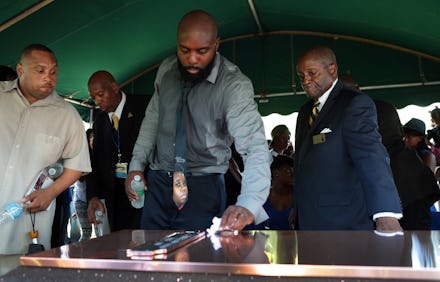Michael Brown's Father Has an Important Message for Ferguson Protesters

The news: As protesters and authorities alike await the decision of the grand jury investigating the circumstances of unarmed teenager Michael Brown's death, his father has an important message: There shouldn't be any violence in St. Louis, regardless of whether Officer Darren Wilson is indicted for killing his son.
"My family and I are hurting," Michael Brown Sr. says in the video released this week. "Our whole region is hurting. I thank you for raising your voices to end racial profiling and police intimidation. But hurting others or destroying property is not the answer. No matter what the grand jury decides, I do not want my son's death to be in vain. I want it to lead to incredible change, positive change, change that makes the St. Louis region better for everyone."
"We live here together," Brown added. "This is our home. We are stronger united."
The video was created by St. Louis Forward, a website that hopes to "create a new standard of inclusion for all residents" in the city's metropolitan area. Others who have spoken through the website include Ferguson Commission leaders the Rev. Starsky Wilson and Rich McClure. They were joined by Attorney General Eric Holder, who announced new guidelines for the authorities on how to maintain order and urged calm following the results of the inquiry.
"History has ... shown us that the most successful and enduring movements for change are those that adhere to non-aggression and nonviolence," said Holder.
The background: Eerie photos of boarded-up businesses and a pre-emptive state of emergency point to low expectations that all will indeed remain calm after the announcement, with law enforcement preparing for what they see as an inevitable clash with protesters and a small minority of area residents who have threatened violence.
The deployment of the National Guard to back up police forces the night of the announcement has rankled locals, like St. Louis Alderman Antonio French, a powerful voice in the greater St. Louis community.
Indeed, St. Louis and state authorities seem convinced there will be bloodshed in coming days, although the Don't Shoot Coalition, which represents the majority of protesters, is only planning peaceful protests. Protesters fear that the police will crack down on nonviolent demonstrations. Amnesty International has accused police officials of human rights violations during the protests following Brown's death, including the arrest of many journalists.
The situation in Ferguson is particularly bad, but tensions between minority communities and the authorities are bad across much of the country. As Mic's Becca Stanek writes:
Between August 2013 and August 2014 — the month of the Ferguson incident — a Public Religion Research Institute survey found that the belief that minorities are unfairly targeted by law enforcement increased across all demographics in the U.S. population. Similarly, an Atlantic Media/Siemens State of the City poll, conducted before Brown's death, found that only 35% of urban minorities reported they had "a lot" of confidence in their local police forces.
Whatever comes out of the courts in the near future, it will not solve the long-standing tension between Ferguson's minority population and its police department; only long-term community engagement and a commitment to better police practices will. Neither of which would be made more likely by violence.
Why you should care: Hopefully Brown's call for nonviolence will help prevent rash actions on the part of either police or protesters following the grand jury's decision, which most observers expect will exonerate Wilson of criminal wrongdoing.
Meanwhile, Wilson is in the process of resigning from the Ferguson Police Department. "Nobody comes to work wanting to have it end that way," Ferguson Police Chief Tom Jackson told ABC News. "It's tragic for the family and for the community, and me as a chief to have that happen – the use of deadly force is a terrible, horrible thing."